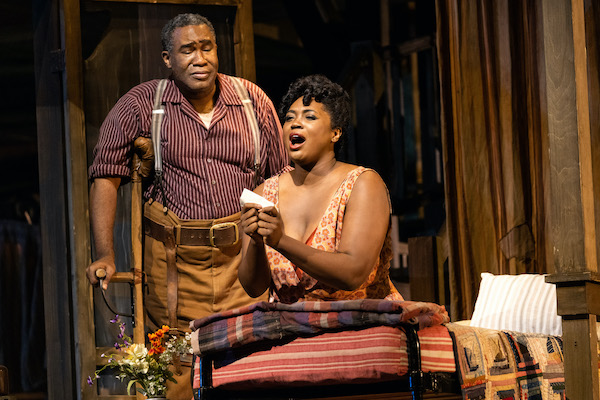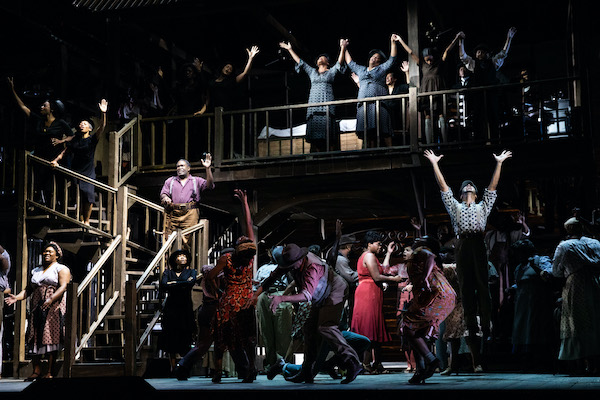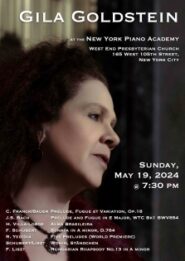Met’s triumphant “Porgy and Bess” returns, deeper and even more compelling

If it’s possible for even the slightest bit of good to have come out of the pandemic shutdown of 2020, then the Metropolitan Opera’s revival of Porgy and Bess, which opened at Sunday’s matinée, is a positive result of the pandemic.
This production, directed by James Robinson, debuted in the fall of 2019. And with the intervening year lost, the performance was still fresh in the memory—the same production but more comfortable and lived in. The singers, musicians, and audience all knew Porgy and Bess that much better, and it was that much more present in the mind, so this revival felt like an even deeper experience with greater closeness between the stage and the seats.
A vital component of this refreshed and vivid experience was that the excellent cast from 2019 is near complete for this revival.
Bass-baritone Eric Owens and soprano Angel Blue reprise the title roles, and tenor Frederick Ballentine and bass-baritone Alfred Walker are back as the antagonists, Sportin’ Life and Crown. Mezzo-soprano Denyce Graves was once again Maria, and soprano Latonia Moore returned as Serena—with her “My man’s gone now” and “Oh, Doctor Jesus” even more wrenching and incendiary than two years ago.
The only prominent changes in the cast were soprano Janai Brugger, replacing Golda Schulz as Clara,, the wife of Jake (bass-baritone Ryan Speedo Green) and tenor Joshua Blue (no relation) replacing Jamez McCorkle as Peter. David Robertson was back to conduct, as stylish a performance a previously from the MET Orchestra.
Style was the key, with everything pushed further from 2019. With everyone more comfortable and knowledgeable in the music, the details were affecting. From the orchestra, that meant the clarinet’s fluid and expressive transition from the high energy of the Introduction to the gorgeous, uncanny happy lament of “Summertime,” which Brugger sang with a balance between operatic convention and pure pop songfulness.
The next great lament came at the beginning of Scene 2, with the chorus singing “Gone, gone, gone” after Robbins’ (tenor Chauncey Parker) death at the hands of Crown. The phrasing was more natural, like an exhaled breath, and the sound was richer, with less thinking in the way of what the body felt and the voice produced.
This showed the kind of familiarity, not just with the notes but with the characters, that deepens both one’s appreciation for the opera and how the singers brought it to life. They simply knew the roles even better than before, which was valuable because in sheer technical terms, the singing wasn’t quite as fine overall as in 2019, but the full performances were more natural, and much more affecting.
Owens was a prime example. His voice sounded tight and a little leathery at first, without his usual carrying power, and it took time for his tone to open up. But he was still superb as Porgy. Beyond the color of his voice, he sang with easy but exact phrasing and excellent articulation. One had the sense of Porgy saying exactly what he meant, and that made the character’s unusual combination of naiveté and self-assurance both believable and dignified. Owens presented Porgy with a sense of calmness and steadiness that made the growth of the relationship between he and Bess real.
That steadiness worked beautifully with Blue’s performance as Bess. She was in fine voice from the very start, and her singing gained meaning and expression as the character grew more complex; Blue changed her approach as the character reacted against the antagonist and each protagonist. She was casual at her entrance in Act I, full of gorgeous sound and deliberate phrasing in a very moving duet with Owens on “Bess, you is my woman now,” then spiky and volatile in her articulation in the harrowing Act II scene with Crown, and an intense “Oh Gawd!/There’s a boat that’s leaving soon for New York” in Act III.
Opposite this was the dangerous and charismatic volatility of both Crown and Sportin’ Life. Walker was commanding vocally and physically, singing with easy energy, the fine sound of his voice conveying the character’s mockery of everyone around him. Ballentine sounded slightly rougher and more strained than previously; but his voice still danced, and he moved expressively back and forth between charm and hostility with each phrase. In their major scenes with Bess, both were riveting, whether commanding her to stay with him (Crown) or manipulating her into leaving with him (Sportin’ Life).
As with the singing, the orchestral playing was full of style, the musicians hearing the bounce and beauty in Gershwin’s music, and sounding as if they relished every syncopation and orchestral color. Robertson’s pace in the first two acts felt slightly rushed yet the beauty and power of Act III was perfectly shaped. After “My man’s gone now,” Robertson put down his baton and joined the audience in their ovation for Moore.
The production remains atmospheric and effective. Robinson’s set is open and full of detail, framing the communal social environment of Catfish Row, and capturing the threat of the deadly hurricane. Camille A. Brown’s choreography was again an outstanding feature, turning the visual representation of Harlem Renaissance painting into movement.
All the components work seamlessly in a drama that, seeing it again so soon, reveals itself as an American version of the great Verdi operas, and an equal of them. The combination of the masterful score and the marvelous tunes that linger in memory, the complex and contradictory characters who could live in real life, outside the artifice of opera, and both the vernacular style and the inherent recognition that these are Americans on stage, make this a great and important revival.
On paper, the opera ends in a pathetic way, with Porgy’s desperate plan to push his cart 1,000 miles to New York—he doesn’t even know where the city is—to find Bess and take her away from Sportin’ Life. Here, Owens’ seeming limitations turned into triumph, his voice not just opening up wide in the closing moments, heard easily through the chorus, but his focus and steadiness absolutely convincing one that Porgy was real, and that there was nothing pathetic, nor impossible, about his task.
Porgy and Bess runs through December 12. metopera.org







